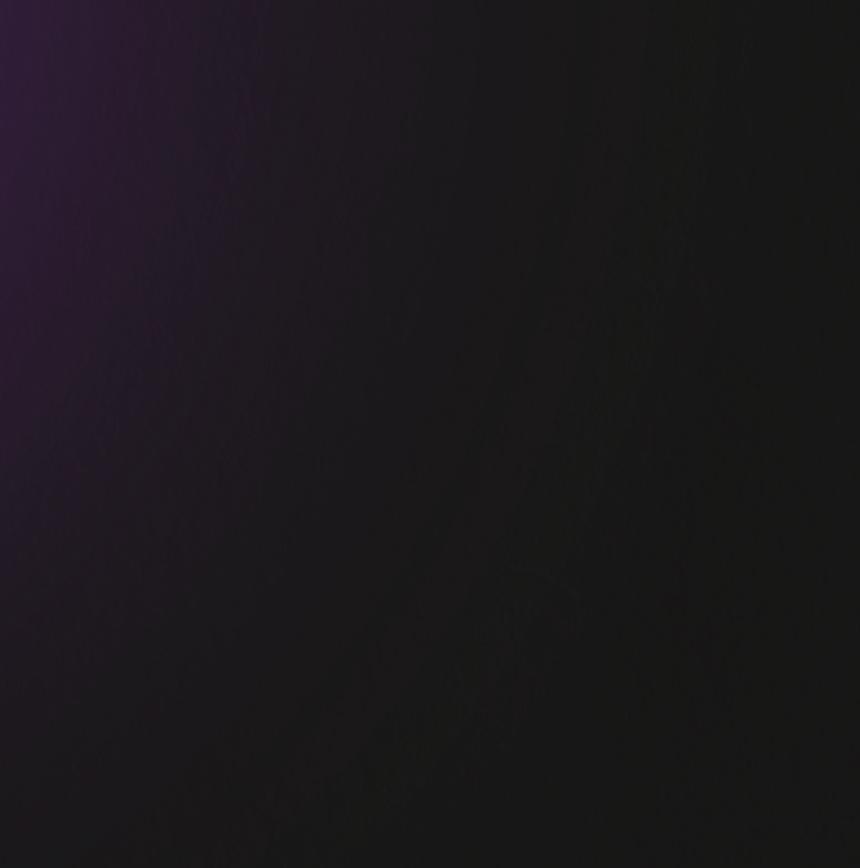














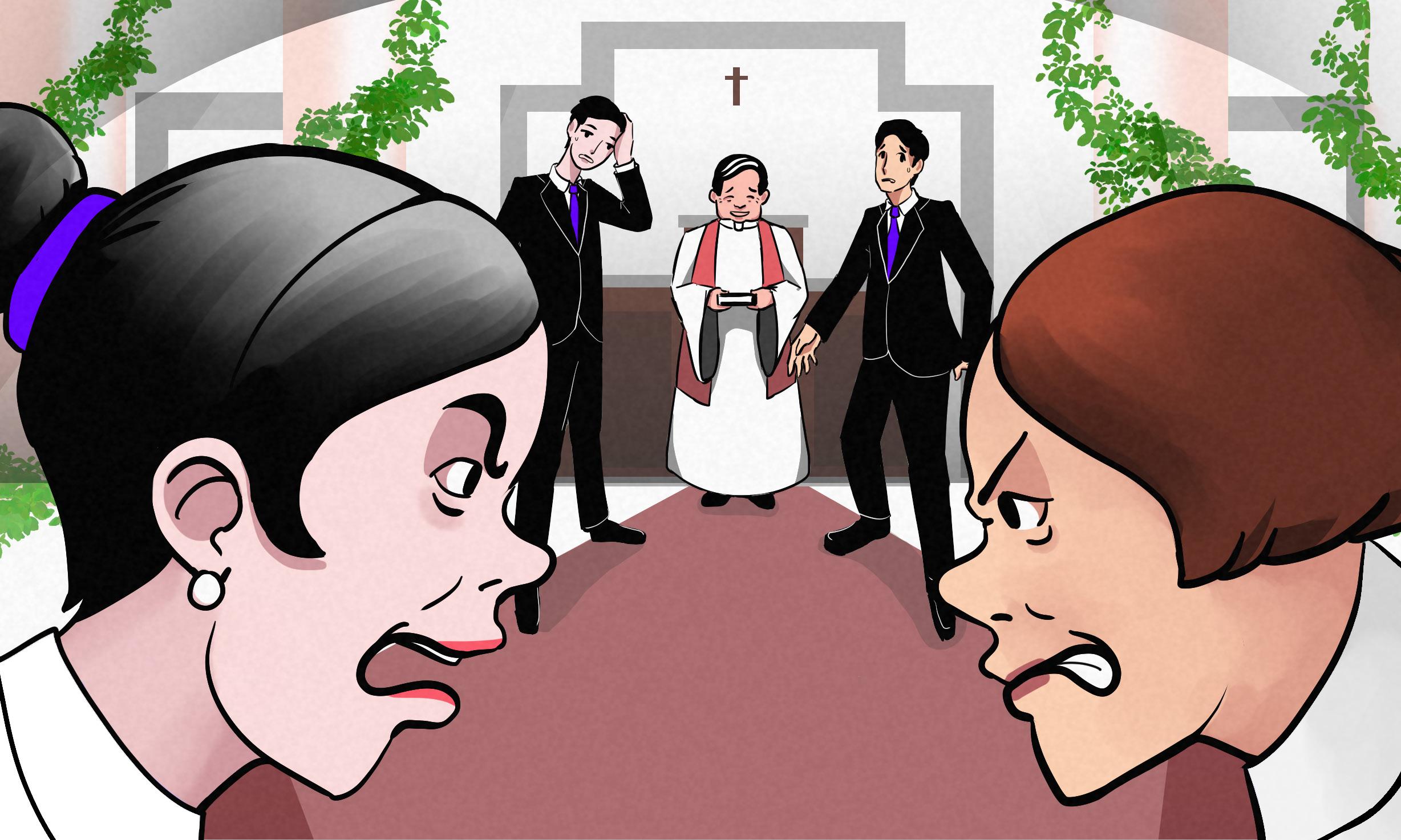
EDITOR-IN-CHIEF
Petra Chase eic@the-peak.ca
COPY EDITOR Michelle Young copy@the-peak.ca
FACT CHECKER
Karly Burns factchecker@the-peak.ca
NEWS EDITOR Olivia Sherman news@the-peak.ca
NEWS WRITERS
Hannah Fraser and Yashita Dhillon
OPINIONS EDITOR Olivia Visser opinions@the-peak.ca
FEATURES EDITOR
Daniel Salcedo Rubio features@the-peak.ca
ARTS & CULTURE EDITOR Izzy Cheung arts@the-peak.ca
HUMOUR EDITOR C Icart humour@the-peak.ca
STAFF WRITERS
Hailey Miller, Kaja Antic, and Yasmin Hassan
BUSINESS MANAGER Yuri Zhou business@the-peak.ca (778) 782-3598
PROMOTIONS MANAGER
Juliana Manalo promotions@the-peak.ca
PRODUCTION & DESIGN EDITOR
Abbey Perley production@the-peak.ca
ASSISTANT PRODUCTION EDITORS Minh Duc Ngo and Josh Ralla
PHOTO EDITOR Gudrun Wai-Gunnarsson photos@the-peak.ca
WEB MANAGER Subaig Bindra web@the-peak.ca
MULTIMEDIA EDITOR
Emma Ciprian
ASSISTANT MULTIMEDIA EDITOR
Quinn Masselink
DISTRIBUTION COORDINATORS
Anastasia Shatska and Michelle Leung
BOARD OF DIRECTORS
Emma Jean, Payal Raj, Olivia Visser, and Yuri Zhou
CONTRIBUTORS
Cliff Ebora, Den Kinanti, Victoria Lo, Dylan Tonekham, and Freida Watermelon
PEAK ASSOCIATES
Amirul Anirban, Amrit Kamaal, Kriti Monga, and Alyssa Umbal
COVER ARTWORK Gudrun Wai-Gunnarsson
The Peak MBC2900 8888 university Dr. Burnaby, BC V5A 1S6 (778) 782-5110
READ THE PEAK


Follow us on Instagram, at @thepeakatsfu and check out our YouTube channel, The Peak (SFU).
Find extended and cited articles at the-peak.ca Download digital issues at issuu.com/peaksfu
STAY CONNECTED ABOUT US
The Peak is the official weekly student newspaper of SFU and is published every Monday. We’re funded by a student levy and governed by a Board of Directors. Any SFU student can apply to become a writer or editor.
We reserve the right to edit submissions for length, as well as style, grammar, and legality. We also reserve the right to reprint submissions at any time, both in print and on web. We will not publish content that is sexist, racist, or otherwise prejudiced.
We acknowledge that The Peak’s office is located and our paper is produced, distributed, and read on the Unceded Coast Salish Territories of the xwməθkwəy̓əm (Musqueam), səlilwətaɬ (TsleilWaututh), Kwikwitlem (Coquitlam), Kwantlen, Katzie, Semiahmoo, and Skwxwú7mesh (Squamish) Peoples. Unceded means that this land was never surrendered, relinquished, or handed over in any way. We recognize that the unceded land that we occupy includes not only the SFU Burnaby campus, but extends to the land occupied by the Vancouver and Surrey campuses as well.
Vancouver illuminated City Hall and Burrard Bridge in blue and white lights
HANNAH FRASER NEWS WRITERContent warning: mentions of genocide and graphic descriptions of violence.
On May 14, Vancouver City Hall and the Burrard Bridge were illuminated with blue and white lights by the City of Vancouver to celebrate “Israel Independence Day.” While the day represents the establishment of a Jewish homeland for some, it is also a reminder that mass displacement and violence against Palestinians created the state and continues to be ongoing. Palestinian rights activist groups and Vancouver residents gathered at City Hall to protest the city’s decision to put on the commemorative lights — but the lights still shined.
The coalition of protestors expressed outrage that the city would choose to commemorate a country that has killed at least 36,000 Palestinians since October. Approximately “1.7 million Palestinians, nearly 75% of the population, are estimated to be internally displaced — with many having been displaced multiple times” by Israel’s invasion.
Members of Independent Jewish Voices, “a grassroots organization grounded in Jewish tradition that opposes all forms of racism and advocates for justice and peace for all in Israel-Palestine,” joined the protest. The Peak corresponded with Rebecca Haber, a local member.
“To me, it signals from the city an endorsement of Israel’s actions, which are violent and are causing unbelievable suffering of Palestinians,” said Haber. “We see the deaths, the injury, displacement, starvation, so in that, I do think it just shows a lack of regard for Palestinian life and dignity.”
Hundreds gathered at Vancouver Art Gallery for an inclusive approach to global human rights issues
YASHITA DHILLON · NEWS WRITEROn May 17, a rally for 2SLGBTQIA+ rights took place at the Vancouver Art Gallery. This event was led by the Society of Queer Momentum Canada, which is a movement founded by 2SLGBTQIA+ organizations to combat the challenges faced by the queer community. The rally coincided with the International Day Against Homophobia, Transphobia, and Biphobia.
May 11–17 marked the first National Rainbow Week in Canada, which is a movement of solidarity and advocacy for queer rights across the country, and calls for governmental actions and policies to protect these rights. Pride Month is celebrated internationally in June, which highlights the history of struggle the 2SLGBTQIA+ community and their achievements. Instead of commemorating the past, National Rainbow Week looks toward the future, advocating for further equality.
This week of activism was started by Momentum Canada, in partnership with Fierté Canada Pride and the Enchanté Network to urge governments and policy makers to promote equality and address anti-2SLGBTQIA+ hate. All three of these organizations are focused on national movements for equality for the 2SLGBTQIA+ population through rallies and campaigns across the country.
Throughout the week, over 25 rallies took place across the country, including in major cities such as Ottawa, Toronto, Saskatoon, Vancouver, Winnipeg, and Fredericton, according to the Society for Queer Momentum Canada.

Another local Palestinian rights activist, Tamer AbuRamadan, told the Vancouver Sun, “I find it offensive that after seven months of complete silence on Palestine, the City of Vancouver would add insult to injury by lighting the Burrard Bridge with the colours of the state committing what the International Court of Justice has ruled is a plausible genocide against the Palestinian people.”
It just shows a lack of regard for Palestinian life and dignity.
REBECCA HABER
MEMBER OF INDEPENDENT JEWISH VOICES
Vancouver Mayor Ken Sim issued a statement reading, “It’s important to note that this illumination does not imply or express support for the politics of any country.”
Prime Minister Justin Trudeau remains firm in his stance on Israel’s “right to defend itself” after Hamas’ attacks on October 7, while “strongly emphasizing the importance of taking all measures to protect civilians and to minimize casualties.” Trudeau also stated he was “horrified” after the recent bombings of civilian tents in Rafah, leaving dozens of civilians to burn alive. He stated that “Canada in no way
The city’s website said they “reserve the right to decline requests from countries where there is political unrest or conflict.”
“It was surprising and disappointing that the city wouldn’t exercise that right,” Haber responded. “It definitely sends a signal.” Haber added, “What we need to be focusing on is the suffering and the humanitarian crisis in Gaza.
“Things that may take away from that attention are definitely a problem,” she stated.
Trudeau also stated, “This year’s celebrations of Israel’s independence come at a particularly challenging time for Jewish communities.” He added, “In recent months, we’ve seen a disturbing rise in antisemitism across the world, including right here in Canada. This must not continue.” Haber stated this response conflates “Israel with Judaism, and so when that happens it can lead to a place where people see criticism of Israel as antisemitism.
“That’s just so problematic and not correct,” she said. Haber highlighted the importance of speaking out against countries like Israel that are killing tens of thousands of people, including over 14,500 children. “It’s very dangerous if you feel that you can’t criticize that or speak out against that because of a concern for antisemitism,” she expressed.

The Peak spoke with River Pengelly, an organizer with the Vancouver Trans March.
“We’ve seen so many attacks from the far-right and establishment politicians recently. We wanted to demand better from our government on queer equality, trans healthcare, youth safety, as well as demonstrate Indigenous and Palestinian solidarity,” said Pengelly.
Canada has witnessed anti-queer and anti-trans sentiment over the past few years. In Saskatchewan, a new law requires parental permission for students to change their pronouns.
“It’s clear that the government policy and decision making on this issue wasn’t thoughtful or based on any evidence,” said Cee Strauss, a senior staff lawyer with the Women’s Legal Education and Action Fund, noting a “an anti-transgender wave happening across the country.”
Alberta’s new law to rescind protections for trans and queer youth, which many argue undermines their healthcare and
bodily autonomy. “I have witnessed firsthand the struggles faced by children who are brave enough to express their true gender identity,” said Catie Jones, a United Steelworkers Union member and mother of a transgender child in Alberta. “This is not just about my child, it’s about every transgender child in Alberta. Our children deserve the right to their own gender identity and expression, as well as rights over their bodies.”
“Most importantly we want politicians currently in power to do more than pay our community lip service with pretty pinkwashed words and to keep their promises and commitments to trans and queer rights,” Pengelly said. “We chose speakers from within our community whose intersections of experience we felt were necessary to hear from.”
The rally also highlighted the role of youth led justice in the campaign for 2SLGBTQIA+ community. “Youth are the ones who have to deal with this head-on, not only in school but also at home,” Pengelly said. “Their voices are incredibly important. It’s their future that is being determined and fought for right now.”
Union, instructors, and alumni weigh in on the impact of the closure and layoffs
YASHITA DHILLON · NEWS WRITERSFU recently decided to close down the Interpretation and Translation programs by the end of May 2024 and the English Language and Culture Program by the end of August. They cited recent budget cuts, but many are left questioning this decision and its impact on the community.
The Teaching Support Staff Union (TSSU) stated the programs’ closure was decided “with no consultation with the union, and means nearly 20 continuing instructors and an additional 20 long-standing temporary instructors will lose their jobs.” 16 more long-standing continuing studies program educators were also let go.
The Interpretation and Translation programs included specialized training for medical, legal, and translation interpretation to prepare students to become professional interpreters and translators in these fields. It includes several programs “that train linguistically and culturally fluent professionals to facilitate effective cross-cultural communication.”
The English Language and Culture program was designed to help students improve their English skills. Both programs are part of the continuing studies department, which offers a total of 23 programs. The English Language and Culture and Interpretation and Translation programs are the only ones with unionized instructors and are the only programs being
They demand the university divests funds from Israel
YASHITA DHILLON ·NEWS WRITER
On Monday, April 29, members of the UBC community set up an encampment at their MacInnes Field to protest the university’s lack of action for Palestine. The camp amassed “about 100 people and 75 tents,” with signs posted around the area like “Free Gaza” and “Palestine Forever.” The encampment and protest followed after the People’s University, a student-led movement for Palestinian liberation, presented their demands to the university. The demands included divestment from Israeli companies and academic boycotts of Israeli universities and institutions who are “complicit in the Israeli apartheid regime and in the oppression and genocide of the Palestinians.”
Following the Israeli occupation of Palestine in 1948, Palestinians have been subject to violence at the hands of Israeli forces, being systematically displaced, harmed, and killed. In retaliation to the Gaza-based militant organization Hamas’ attack, Israel launched attacks on Palestinian civilians. This has been condemned internationally as a genocide by the UN, with over 36,100 Palestinian civilians killed at time of writing.
Many university campuses across Canada and the US are hosting encampments in solidarity with Palestine. The University of Calgary, McGill, University of Alberta, and UBC are just a few, all calling for a ceasefire and urging a similar set of demands to their respective institutions.
The People’s University continues to urge the university to divest from “companies complicit in Palestinian human

shut down. SFU’s recent cut-backs have caused around 85 positions and over 100 workers to be laid off, CBC reported, ranging from class instructors to IT support to campus bookstore employees.
The May 14 announcement to shut down these programs came as a shock to instructors and students. “We didn’t have any details forthcoming,” said Scott Yano, ELC instructor at SFU and TSSU steward, in an interview with The Peak.
SFU states budget cuts are a result of low international student enrollment and these programs are a support for international students. The union, faculty, and alumni are contesting this rationale.
“SFU assured its instructors and students that the academic mission of the university would not be affected by the budget cuts. They said instructors would not be impacted. They lied,” Kayla Hilstob, TSSU chief steward, told CityNews Vancouver, noting university executives receiving “large annual wage increases of up to 6.75%.”
“We provide a cultural background for people to enter into the university,” said Yano. The English Language and Culture
program teaches “English conversation in groups, friendly interaction with classmates and teachers and real English found in everyday situations.” The aim is to prepare students for life in Canada and potentially work in Canadian business or diplomacy.
“It’s been a 30-year project, and everybody is disappointed and sad to see it end,” Yano said, noting his work as an English Language and Culture professor since 2004. “It’s been our working life’s work, and many of us are at the end of our working life. We devoted a lot to SFU and to its success and we hope that the administration of the university realizes that.”
Silvia Xalabarde, president of Society of Translators and Interpreters of BC told The Peak these closures have raised questions about SFU’s commitment to being inclusive and its impact on the community. “The consequences of this for many people are going to be that they’re not going to have the language support that they need in order for their voices to be heard, in order to participate fully in society,” said Xalabarde.
The union assures they are “working with the instructors and affected stakeholders to question and to try to reverse this shocking decision” and will “negotiate a fair compensation scheme that respects these instructors’ many years of service.”
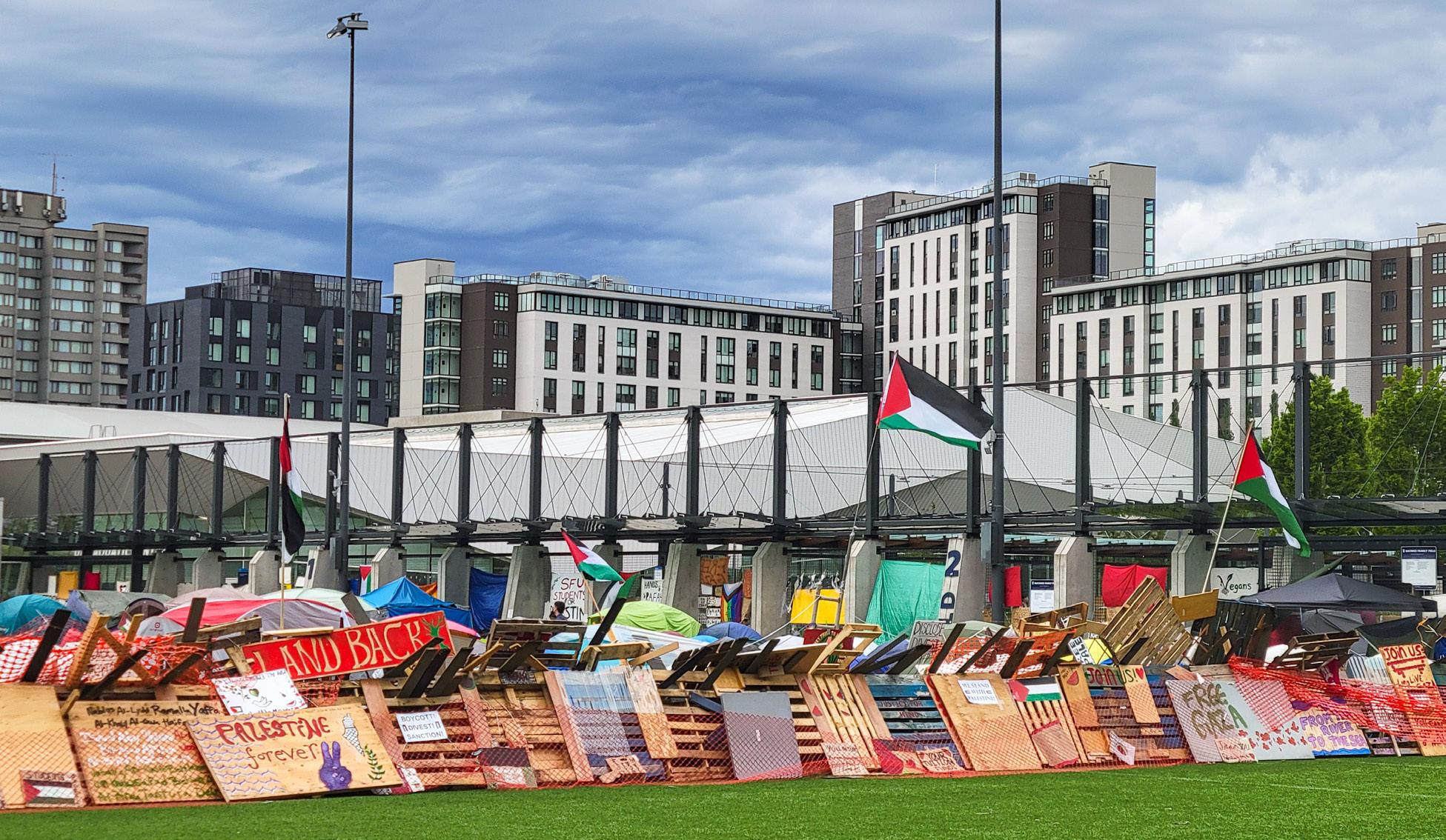
rights violations,” despite a reaffirmation from UBC president Benoit-Antoine Bacon that they will not support the Boycott, Divestment, Sanctions movement. Companies such as Caterpillar, Hewlett Packard, and Lockheed Martin are some of which UBC holds shares in, which provide armored bulldozers, computer hardware, aircraft and ground artillery to Israel.
In a statement, Faculty for Palestine SFU members pledged “support for the demands of the People’s University of Gaza at UBC and adherence to the community agreements” and that “faculty solidarity with student activism is entirely consistent with SFU’s mission of research, pedagogy, dialogue and debate in an atmosphere of social justice and liberation.” SFU also owns shares in war contractors and weapon manufacturers aiding the Palestinian genocide, such as CAE, Booz allen Hamilton, and BAE Systems. Faculty for Palestine SFU are a part of a broader network of university faculty “taking root in and across over 130 universities in North America,” and they continue to call on SFU to divest from military companies.
“Our immediate concern is for the hundreds of thousands
of Palestinians currently facing full-scale military invasion in Rafah, and all Palestinians facing escalating violence and genocide at the hands of the Israeli military,” Anna Swanson, a member of Independent Jewish Voices, said. With threats of intervention from university administrators and a growing police presence on campuses, Swanson stated, “If in their effort to protect one specific group of students in isolation, universities resort to policies and legislation that chill or silence freedom of expression, this could hurt the entire academic community.”
Encampments are just one of the many ways students are taking action. Numerous student communities and organizations have responded to their institutions’ inaction through different forms of protests, marches, and rallies. A list of camp rules from the UBC encampment states, “We commit to grounding ourselves in the cause of this encampment: solidarity with Gaza and the Palestinian people who are facing genocide. We reject co-optations and centering of anyone but the people of Palestine.”
This is a developing story that The Peak will continue to cover in the future.
Increasing access to public transit networks increases accessibility and livability
DYLAN TONEKHAM · SFU STUDENTAs climate change remains a massive threat to humanity, the Canadian government has pledged initiatives to fight it, such as the 2030 emissions reduction plan. Though a noble plan to combat emissions, there’s a better solution that isn’t being pushed forward nearly enough: we’re in dire need of better public transit.
Unlike commuting by car, public transit can be inherently efficient when employed correctly. Take a look at any grid-locked street: you can only fit so many people into the space occupied by a car. Ironically, an old Saturn car ad demonstrates this inefficiency by replacing cars on the road with people. The excessive distance between everyone showcases just how much physical space cars occupy. Those who use transit are cars not on the road, and emissions that aren’t produced.
You might ask, “If emissions are the problem, what about electric vehicles?” Current federal initiatives push for consumers to buy “zero-emission vehicles” (ZEVs) in an effort to reduce individual gas emissions. As Canada was found to be one of the worst carbon emitters, this incentive makes sense on the surface. Commuters driving electric vehicles don’t emit nearly as many greenhouse gases as those in gas cars do. However,
DESTRUCTIVE DISCUSSIONS

improvement. Frequent service should be plentiful wherever possible. Riders should be able to arrive at a bus stop and expect a bus rather than a long wait. “Don’t worry, it’ll come soon,” is an expectation only those boarding the SkyTrain or specific RapidBus lines can hold.
Take a look at any grid-locked street: you can only fit so many people into the space occupied by a car.
Consumers are sold the idea of reducing their own carbon footprint with ZEVs, but other pollutants are seldom talked about. Tires rolling against roads release toxic compounds and material into the air, water, and subsequently our bodies. ZEVs are typically heavier than their gas counterparts, which “wears out tires faster.” Mass mining of metals for ZEV batteries also pollutes water supplies in South America, such as the “lithium triangle” of Argentina, Bolivia, and Chile — not to mention the ethical concerns of poor working conditions.
With TransLink servicing about 233 million trips in 2023, people are clearly moving through the network’s SkyTrain, buses, and other services. Yet, there’s plenty of room for service
Skin tone has nothing to do with talent
YASMIN HASSAN · STAFF WRITER
The word “racebending” was originally coined by fans protesting against the whitewashing of Avatar: The Last Airbender’s live action cast. Nowadays, the phrase and its variations are often used in negative and even racist contexts. The phenomenon of production studios casting people with a different skin tone than their original character is often used as an excuse to attack BIPOC and perpetuate racism.
We also shouldn’t rely on remakes as a source of genuine representation. Casting a person of colour as the new face of an outdated white character isn’t the same as creating a unique cultural story with actual significance to BIPOC.
This year, it was announced that Jamie Lloyd would direct a version of the famous Shakespearan tragedy Romeo and Juliet starring Tom Holland as Romeo and Francesca AmewudahRivers as Juliet. After Rivers announced she would be playing the role of Juliet, what followed were multiple attacks on her appearance and the decision to cast her. Rivers’ social media page became flooded with hate-filled, racist comments, highlighting just how difficult the entertainment industry can
be for Black women. Even when characters are canonically dark skinned, like Rue and Thresh in The Hunger Games, and are casted as such, there has been internet backlash. This shows that these so-called “concerns” are only poor covers for being racist.
This isn’t the first time the internet has reacted extremely toward “racebending” in modern media, either. Another example was when Halle Bailey was cast as Ariel in the live-action remake of the Disney film. Cultural background isn’t important to Ariel’s story, so excuses and concerns about her whiteness hinge on racism and prejudice. The film went through much criticism online, which was completely undeserved. Bailey herself said, “I want the little girl in me and the little girls just like me who are watching to know that they’re special, and that they should be a princess in every single way.”
The concept of “racebending” can be problematic in itself, especially in the context of BIPOC performers. This discourse undermines actors’ talent by focusing on their skin colour. However, we also shouldn’t rely on remakes as a source of genuine representation. Casting a person of colour as the new face of an outdated white character isn’t the same as creating a unique story with actual significance to BIPOC. Hollywood is infamous for being unoriginal and running out of ideas; their quick fix is to just recast a pre-existing story. This rarely adds anything new when it comes to content and representation. We should uplift marginalized actors instead of perpetuating the twisted narrative of “diversity hiring,” which claims BIPOC are hired more for their skin colour than skill. BIPOC have historically lacked representation in the entertainment industry for ages. Disney princesses, theatre roles, and film casts have been largely white and catered to white
Night service for when regular transit is inactive should also be available. Though TransLink runs their NightBus service, most lines are in Vancouver, such as the N19 bus from Downtown to Surrey Central Station. Need to go anywhere south or east of that? Tough luck. Understandably, transit at night isn’t going to be as rapid or frequent as daytime service, but it must be better for those who need it.
This is more than an environmental issue. Cars harm us on a deeper social level, in a way access to public transit can rectify. Transit-oriented communities aim to increase density where there is rapid transit access. If housing is close to amenities such as grocery stores, community centres, education, entertainment, and more, residents can make use of them without the explicit need for a car. Those who cannot afford cars, who cannot drive, or who choose not to drive would have greater opportunities in their communities.
Canada has grown tremendously in recent years, with its population reaching over 40 million this January. With transit becoming increasingly overcrowded and adverse climate change effects looming on the horizon, it’s imperative that there is increased access to transit — our cities depend on it.

audiences. We should put an end to harmful, outdated trends of underrepresentation in film.
Rivers is a well-seasoned professional who already has Shakespearean roles under her belt; she was the best person for the role. Concerns about “race swapping” are a baseless and irrational excuse for racism. But at the same time, we need to create and celebrate BIPOC stories. Media representation is more important than any attachment to a character’s original appearance.

The dreaded midday due date has been encountered by most students at some point in our degrees. Assignments with a due date of anything before 11:59 p.m. should be illegal. Maybe I sound entitled, but midnight is almost always the standard for assignments in university. That’s why it’s so easy to miss a freakin’ 12:00 p.m. deadline that your oddball professor has decided is perfectly reasonable.
Look, I would love to have more time on my hands — but please don’t punish me for being employed! I promise you won’t even notice the difference between a 12:00 a.m. and p.m. deadline. I mean, my homework skills are so impeccable that you probably can’t even tell my assignment was finished the day of. Probably. I might even change the date to a couple days prior so it looks like I started it earlier.
Most of us opt to complete our assignments in the evening because that’s our spare time. Maybe these deadlines are related to a professor’s schedule, but I’d honestly rather have an assignment due a day earlier if it means I don’t have to do homework in the morning. You may be thinking, “Why don’t you just start it well ahead of time so you don’t have to finish your homework the day it’s due?” And to that I say, “I’ll have to get back to you when I’m less busy.”
CENSORSHIP
Censoring pro-Palestine symbols is a political stance

KAJA ANTIC · STAFF WRITER
Across numerous mediums, there’s been a rise in censorship of Palestinian support through clothing and accessories, coinciding with the increased violence by Israeli forces against Palestinian civilians. Not only is this an infringement on freedom of expression, but it also silences those bringing attention to the ongoing genocide, uplifting the voices of those in favour of Israel’s crimes.
Those in power hold a double standard when it comes to celebrating Palestinian and Jewish cultures. This April, Speaker of the Legislative Assembly of Ontario Ted Arnott announced the keffiyeh was effectively banned in the Ontario Legislature. The Palestinian keffiyeh is a traditional scarf, usually worn as a headdress, which has olive trees and fishnets in its pattern, reflecting roots to land. Despite calls for him to overturn this ban, he has refused, saying it makes an “overt political statement.”
Shortly after, Vancouver mayor Ken Sim announced his support for the Burrard Bridge being lit up in support of “Israel’s 76th Independence Day.” Sim emphasized the city’s aim to “uphold fundamental freedoms of speech and the ability to peacefully protest.” Yet, Palestinian identity and resistance remains controversial to the Canadian government — so much so that wearing a cultural headdress is disallowed. The keffiyeh is said to date back to 3100 BC, much before the establishment of Israel. Jewish people also used to wear keffiyeh, “because they saw it as part of the authentic local lifestyle.” It was only later that the keffiyeh “became an expression of Palestinian resilience against Israel’s treatment of Palestinians.” The hypocrisy goes to show how support for Israel is presented as neutral, while support for Palestine is seen as offensive and antisemitic.
The keffiyeh ban is just one part of a wider issue with Palestinian censorship. Sarah Jama was formerly a member of the Ontario NDP, and was ejected from the caucus in October due to her comments criticizing the Israeli genocide of Palestinians. She was also censured by the Ford administration, which forbade her from speaking in the provincial Legislature, even if called upon to do so by the Speaker. This not only prohibits Jama’s support of Palestine in the Ontario Legislature, but also forbids her from speaking on any issue brought to the Assembly — silencing any advocacy for her riding of Hamilton Centre, which holds a population of 100,100 people.
The Ontario legislature is not the only political environment to ban keffiyehs. Parliament in the Australian state of Victoria has also forbidden members from wearing keffiyehs. Canada and Australia are British colonies, and while both have claimed to be committed to reconciliation efforts with Indigenous Peoples, their censorship indirectly supports settler colonialism in other regions like Palestine.
Banning the keffiyeh and censoring pro-Palestine messages hides the horrific actions of the Israeli government and amplifies the voices of those in support of the genocide.
Outside the political sphere, there’s been a sharp rise in backlash for speaking against the Israeli apartheid state since October. Others have been punished for mere expressions of culture. For instance, a grade seven student in Halifax had to involuntarily remove the keffiyeh they wore for their middle school’s “culture day” after being called to the principal’s office. Allegedly, he was told the scarf is “a sign of war,” despite trying to explain its cultural significance. While keffiyehs have multiple patterns, some feature olive leaves, as “the olive tree has deep historical and cultural roots in Palestine, and its branches have been associated with peace and prosperity for centuries.” This principal also falsely associated Palestinian symbolism with war — an incorrect correlation that’s increasingly being pushed to undermine Palestinian sovereignty.
Banning the keffiyeh and censoring pro-Palestine messages obscures the violent actions of the Israeli government and amplifies the voices of those in support of the genocide. These entities are complicit in silencing opposition, and are standing on the wrong side of history in an effort to not offend a nation that has killed tens of thousands and displaced millions.

We all know Joy Johnson: the 10th president and vice-chancellor of SFU whose first term has been filled with challenges: the COVID-19 pandemic, the Teaching Support Staff Union (TSSU) strike, and the shutdown of the SFU football team. There’s room for improvement in how she’s handled some of SFU’s more prominent issues. However, she’s also seen us through some exciting advancements: planning for SFU’s medical school, TransLink’s Burnaby Mountain gondola, the First Peoples’ Gathering House, and Burnaby Mountain’s permanent firehall. These were all significant to student life and the university, and if Johnson is here to stay for another five years — there are things we can learn from her first term.
Back in her first month as president, The Peak asked Johnson what her goals as SFU’s president were. She noted students as her first goal and SFU’s equity, diversity, and inclusion as her second. Admittedly, there have been important concrete steps made in these directions, though, at times, these have been led or brought upon only after years of student outcries and activism. This includes the Scarborough Charter on anti-Black racism in universities. and the First Peoples’ Gathering House.
During Johnson’s term, she oversaw the creation of the new vicepresident of people, equity, and inclusion. This new office has been an important space on campus for connecting with students. This happened after SFU signed onto the Scarborough Charter during Johnson’s term. SFU also approved hiring 15 Black faculty members. The move to hire more Black faculty was worked on by key student activists: Osob Mohamed, Gabe Liosis, Balqees Jama, Marie Haddad, and Giovanni HoSang.
When the motion passed, Jama noted this was “historic.” At the time she added, “This achievement is a direct result of Black students organizing and allies supporting. We made sure SFU is aware that we are watching and holding them accountable. We hope the university centres Black academics throughout this process to ensure this is implemented in an effective and safe way, and works closely with the SFU Black Caucus.” Johnson also thanked the students for bringing this motion forward.
The First Peoples’ Gathering House was announced in 2020. While Raven King Stierle, from the SFU First Nations, Métis, and Inuit Student Association (FNMISA), told The Peak the Gathering House was a step towards reconciliation, many students expressed concerns about the lack of adequate consultation. At one meeting for the Aboriginal Steering Committee, “students were blocked from entering” the virtual meeting room, to discuss the Gathering House. This incident occurred a month after FNMISA’s statement for SFU recommending increased student involvement to ensure Indigenous students’ voices are heard, along with ongoing communication with Host Nations. At the time, Johnson apologized, and noted in a statement to The Peak “SFU must acknowledge our role in the harm that has been done to Indigenous peoples through education and research. I am committed to reconciliation as one of my three priorities during my presidency.”
In these cases, the university has attempted to show its commitment to creating space for equity, student inclusion, and social justice. Yet, the road to each of these accomplishments was always at the hands of student activism, with little credit given to them. Students from SFU’s Students of Caribbean and African Ancestry, SFU350, FNMISA, and more, have put in countless hours of labour to make these ideas come to life.
SFU has even actively suppressed student activists. SFU’s Board of Governors declared a climate emergency on January 28, 2022 only after years of SFU350 lobbying the university. In August 2021, SFU350 released an open letter to urge SFU to take action. Then, in September of the same year, the group painted the Climate Justice Mural in Convocation Hall to “raise awareness of their ongoing campaign agains SFU’s fossil fuel investments.” Shortly after, SFU contacted SFU350 announcing the removal of the mural and some of the involved students were threatened with “corrective and/or disciplinary action.” After student outcry, SFU eventually said “student misconduct will not be pursued.” The SFU declaration included commitments to decarbonize university facilities, divest their funds from carbon-intensive investments,
and increase student education — all of which had been proposed and detailed in SFU350’s open letter.
Time and time again, the university implements its campaigns without due recognition of the time and effort students have invested in engaging SFU to change its policies or stance on specific areas. In Johnson’s next term, she should be more committed to listening to student voices, without so much labour necessary from students to implement these changes. Listening is only one aspect of equity work — Johnson should also be actively working towards social justice initiatives concerning student groups, rather than acting in response to them.
More recently, students and faculty have organized interventions and demands related to the ongoing genocide in Palestine. On May 19, the SFSS passed a motion in solidarity with Palestinian students, calling to join Boycott, Divest, and Sanction campaigns. Similarly, the group Faculty for Palestine has joined the call for SFU to academically boycott Israel and divest from corporations that provide weapons and services that have “facilitated the killing, maiming, or displacement of millions of individuals.” SFU Students for Justice in Palestine have also echoed the sentiment, joining the call for divestment and supporting student-led interventions, like taking over SFU Vancouver’s library to protest SFU’s Board of Governors meeting. As of the day of writing this article, SFU is yet to release an official statement on both the genocide in Palestine and student and faculty-led interventions and demands.
Johnson should be prioritizing staff, faculty, and student needs — if that’s what she claims she is truly concerned with.
SFU has long held a reputation of being a radical campus: we have multiple student groups constantly battling for their voices to be heard. There continues to be ongoing campaigns for mobilizing social justice.
Beyond students, community members also have had their fair share of advocacy work. A collection of students, staff, and faculty members called on the university to hire their food and service workers in-house, as opposed to being hired by a third party company. Hiring workers through a third party means these workers are not guaranteed university benefits, extended health benefits, or a living wage. UBC and UVic have both made the switch to hiring their workers in-house. Faculty members have frequently highlighted the importance of hiring workers directly, as many of them are already marginalized folks, such as women and people of colour. Hiring them through a third party exacerbates their vulnerabilities, leaving them at risk of layoffs, as has already happened, and doesn’t grant them the same level of benefits as university-hired workers.
Further, amidst rising financial hardships, the Graduate Student Society and TSSU joined together to protest the funding crisis for graduate students in Canada. Most graduate students rely on income from teaching assistant positions or departmental scholarships. This kind of precarious labour increases challenges for many graduate students. However, rather than creating tangible support systems for the increasing financial burden of education, SFU has continued to raise the cost of tuition. If Johnson is truly concerned with equity, it should be a major priority to finally hire food and service workers in-house and provide a living wage for TAs rather than hiring surveillance companies to spy on them.
None of us want another four years of protests, vague announcements, and student confusion. The university has made some great leaps in the last four years. Yet, it is clear these decisions come from the amazing community of students and faculty, not the administration. Johnson should be prioritizing staff, faculty, and student needs — if that’s what she claims she is truly concerned with. Otherwise, it will be another four years of SFU profiting off students, shielding themselves from criticism, and maintaining SFU’s image. That’s not what we want.
The Sylvia Platters discuss the album, upcoming shows, and more
HAILEY MILLER · STAFF WRITERDripping in carefully curated melodies and groovy sounds that culminate in an upbeat yet relaxed tempo, The Sylvia Platters’ new album Vivian Elixir represents a “range of sounds and feelings.” It’s a guitar-strumming, tambourinerattling, drum-thumping culmination of the band’s musical experimentation and a mix of their personal likes.
Formed in 2014, the Fraser Valley-based band consists of brothers Nick (lead vocals, guitar) and Tim Ubels (drums, vocals), guitarist Alex Kerc-Murchison, and bassist Stephen Carl O’Shea. Their music revolves around jangle pop (raw, dreamy melodies emphasized with guitars), which falls under the indie rock umbrella.
The band’s first record, Make Glad the Day, came out in 2015 and reflects their “eclectic musical appetites,” frontman Nick Ubels told The Peak over the phone. It experimented with shoegaze (loud waves of sound from vocals, feedback, and more). He noted their approach to music involves a “DIY ethos or an independent spirit” — something the band has “naturally been drawn to.”
Ubels said Vivian Elixir “represented us bringing all the pieces together and establishing a bit more of a distinctive musical identity as a group.”

The album touches on topics such as “depression, alienation, conspiracy theorists, and making love last.” “Kool Aid Blue,” one of the band’s most popular singles off Vivian Elixir, has a laid-back surfer-rock vibe. “Heated Meeting” houses a punk rock influence reminiscent of early ‘70s Ramones tracks.
It was through “creative relationships within the band” that the record was shaped, such as recording at the Noise Floor, a “retreat” studio on Gabriola Island. These allowed the band to build a “foundation of trust” that led to experimental tracks like “St. Catherine,” which is a synth-heavy track the band felt “confident enough” to pull off.
Ubels expressed his excitement to play live with new and old friends alike on the band’s spring tour across BC, including Vancouver-based indie-rock contemporaries La Lune. “All of us have full-time work and lives outside of doing this, but this is still something that’s really important to us,” he noted. “The more places we can bring this new album, the better.” Ubels was careful to note that he and his bandmates don’t “harbour too many illusions about blowing up.”
“Music is a great way to connect with others,” Ubels said. “We always are excited when more new people hear our music
and respond to it or connect with it in some way. I’d like to think that we’re sort of in it for the longer haul, and are just slowly building a bit of a body of work that we feel proud of.
“We’ve already started writing lots of material that we’re mulling over for our next release. It’ll be really interesting to see what kind of shape that takes.”
In the conversation with Ubels, it was clear that he and his bandmates will continue to evolve and experiment personally, professionally as a band, and creatively among their artistic approaches. Before hanging up the call, Ubels couldn’t go without stressing the importance of recognizing everyone involved in the success of the band and their latest record. From their producer to their engineer, those involved at the label and who designed the artwork, Ubels’ appreciation seeped through the phone speaker with infinite gratitude.
“It takes a bit of a community, in a way, and we’re really grateful to be a part of that.”
Listen to Vivian Elixir on Spotify, Apple Music, and other music streaming platforms. Follow The Sylvia Platters on Instagram at @thesylviaplatters.
2024
The Poem We Sang
Content warning: mentions of genocide.
Photojournalist, cinematographer, and filmmaker Annie Sakkab unearths the emotions and memories behind forced migration. The documentary delves into a family’s flight from Palestine during the Nakba bombings in 1948, as well as their eventual return to discover their home had been overtaken by settlers. It’s artfully shot in black and white as well as colour, “transforming lifelong regrets into a healing journey of creative catharsis and bearing witness.”
2023
NIGIQTUQ
(The South Wind)
Based on a true story, NIGIQTUQ ᓂᒋᖅᑐᖅ (The South Wind) explores Marguerite, a young Inuk girl, and her life as she moves away from her home in Nunavut. She encounters difficulties in assimilating to the culture of the South until she receives a letter from home that helps her “discover what’s really expected of her.”
2024
What Good Canadians Do
What Good Canadians Do is a culmination of creative efforts from Mi’kmaw poet Rebecca Thomas, Halifax-based artist Andrea Dorfman, and Indigenous artist Phyllis Grant. The short animated film features an original poem performed by Thomas which holds “Canadians accountable for who they believe, and say, they are.” Despite the topic, it is accompanied by Grant’s colourful, child cartoon-like designs.
Streetcar is a short film that follows an actor’s growth as they adapt to the characters they must present themselves as within their work. Kaylah Zander-Nuñez, a Latinx actor from Vancouver, stars. A key cog in the production of this film is Patrycja Mila Kamska, a Polish Canadian filmmaker who is also an SFU graduate. Follow along as themes of personal discovery are unfurled. 2024

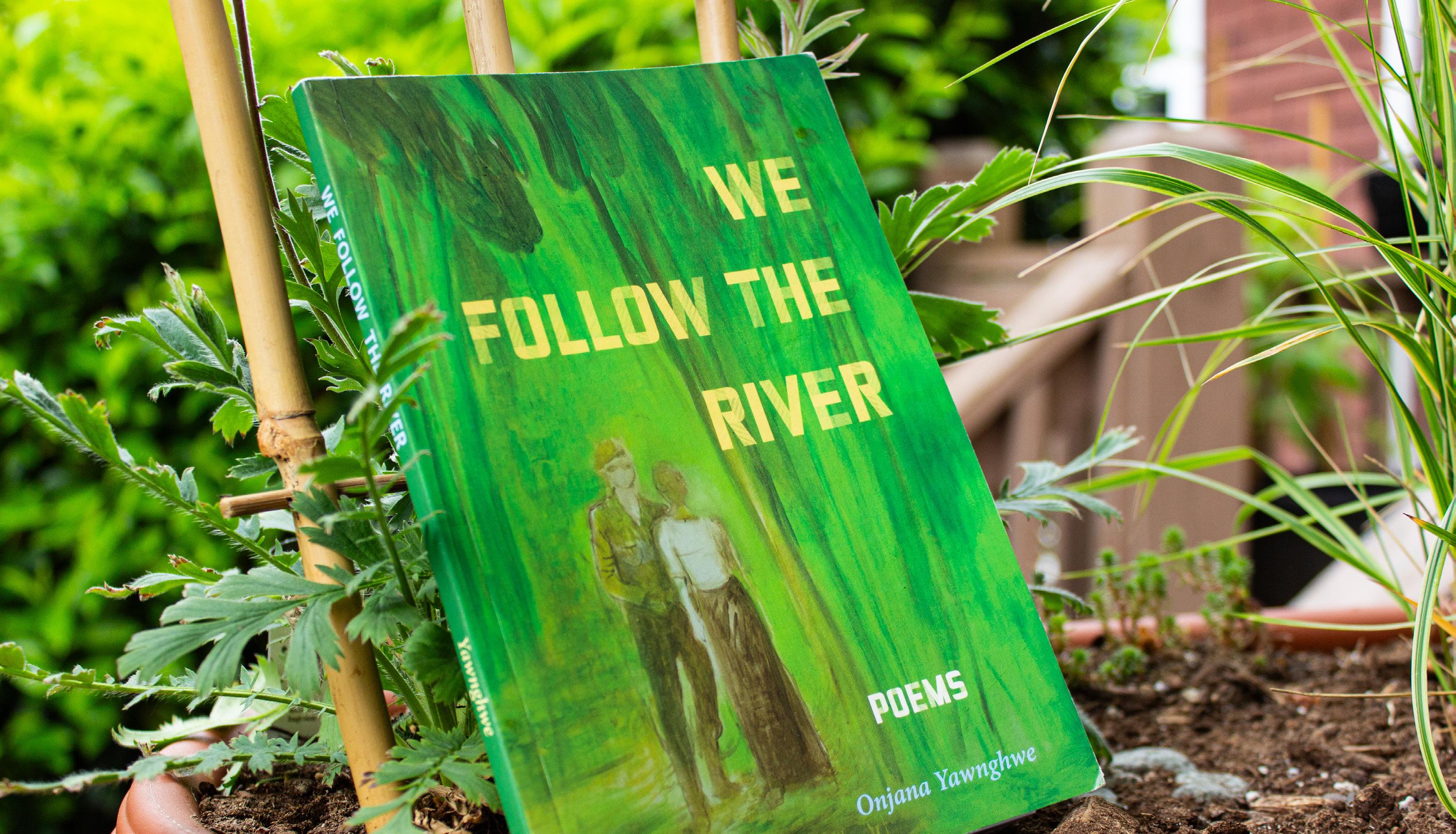
Content warning: mentions of military oppression.
Pictured on the cover of We Follow the River are a young woman and man surrounded by a smoggy jungle of green brush strokes. The man wears a Shan State army uniform — the woman, a longyi (or hsin in Shan), a traditional fabric worn as a wrap-around skirt. This is a portrait of Nu Nu and Chao Tzang Yawnghwe in the ‘60s in their ancestral homeland of Yawnghwe, Shan State, Myanmar. They are the late parents of author Onjana Yawnghwe, painted in watercolour by her brother, artist Sawangwongse Yawnghwe. The poetry collection tells stories of their family heritage, from Nunu and Chao Tzang’s “escape from military violence in Myanmar” and “their exiled existence in Thailand,” to immigrating to Vancouver when Onjana was seven years old.
In our interview, Yawnghwe said she uses language to find home. The book, a poetic stream of memories and experiences, takes the reader through time and across continents as she grapples with “growing up as a foreigner in a foreign land.” Like a river that flows and picks things up into its stream, she sprinkles in details of place, like growing up in Southeast Asia: the lurking geckos, the flavours that come together in a large wok, and a whole poem dedicated to the giddiness of eating a perfect “Green Mango.”
Having taken 20 years to write and publish it, she describes this collection of poetry as a “retroactive prism of experience.
“I started writing it in my early twenties, when I was just beginning as a writer, and had sent the manuscript out to various publishers without much luck,” she said. But when Yawnghwe’s mother passed in November 2022, she was prompted to review her poems with “fresh eyes.”
“The book is a time capsule within a time capsule — a 40-something version of me looking back at the 20-something version of me writing about the six year old version of a yet younger self.”
The selective memories captured in these earlier poems highlight the confusion and isolation of a child in a new environment. When expecting to see snow landing in the summer of Vancouver, she found only a “shirtless boy / skateboarding” (“Landing”). She also explored what it was like being in a class where students and teachers whisper trying to figure out if she’s Chinese.
“Growing up with such a complex cultural identity was a real mixed bag; I never felt connected to any group nor felt I ever belonged,” she said. “We as a family tried to connect with the Asian folks around us. For example, we’d go shopping in Chinatown every weekend to get familiar groceries and to see a community where people looked like us.” Such feelings are explored in later poems through visiting her brother in Italy and returning to Thailand as an adult.
To me, land is connected with a sense of home and place.
Her poetry also recites what she calls memorized “mouth shapes” of Buddhist scripture — she spoke to me about the “ambivalence” of language. It’s “the discovery and love of English while at the same time the betrayal of forgetting the language of your birth,” she explained.
“What little I know of Shan culture I learned from my family, and of Thailand, my childhood experiences.” In one untitled poem, she writes about how her mom described Shan State: “how raw mist would ride over the valley and lag, leaving skin glistening like it’d been dipped in stars.” I could feel the jasmine mist of Inle Lake hugging me while I read that piece.
The poems are all this rich. Yawnghwe ties words together in ways that unexpectedly makes sense. Lines like “hips that swing like a word on a Bangkok street” and “mortar and
pestle thoughts in our pockets” made me physically stop reading to soak it in.
We Follow the River is grounded in a connection to land. Yawnghwe describes how “she witnesses Burma change from white-gloved / British hands meticulously picking rubies from the land / to clouded Japanese faces drooping with hunger and war.” This stems from the intergenerational grief of stolen land. There are also the “countrymen / all rebel-hungry and wanting,” which describes the repressive military regime continuing to cause plight for Myanmar’s ethnic minorities. Vividly, she imagines the sensations of digging into the earth. “To me, land is connected with a sense of home and place,” she said.
Water is also a running theme. “There is something about its perpetual movement that calms me; to me it suggests a way of living, of accepting things as they come, no matter how difficult, with the idea that these things will pass, that nothing is permanent. In general, the two ideas sort of collide: the desire to hold on and the need to let go.”
What stands out about Yawnghwe is her ability to say so much with so little. In an introductory poem called “Crossings,” she describes her parents as “loss unnamed.”
“There is an unknowable quality to our parents,” she explained. This could be trauma “hidden under many layers, or kept locked and secure within themselves.” It could also be “how the act of becoming a parent is on some level a loss of a parent’s life.” She added, “This is often not really acknowledged.” Losing her parents was a “cascade of loss” that led to this book being dedicated to their memory.
“People who pick up this book will know my family, if even a little, and in that way, a tiny part of my parents will live on, even though they are no longer on this earth.”
Discover more about Yawnghwe and her poetry books at her website, onjana.com, find out where to buy We Follow the River at caitlinpress.com, and attend one of her upcoming poetry readings:
I‛ve seen some catty shit in my line of work. Bridezillas, cheating grooms, unsavoury uncles; you name it, I‛ve seen it. When it comes to being a wedding photographer, you are there to capture every single piece of the joyous day the couple will want to cherish and keep forever. Some mothers apparently also want to cherish and keep something forever, and that “something” is their beloved sons. I don‛t know what kind of Freudian oxytocin-induced perspective of life those women have, but boy, is it entertaining.
I was hired for this wedding by a lovely couple of two young men, Jacob and Sean. It‛s always a pleasure to see people freely enjoy their special day. Jacob‛s mother, Martha, seemed like a nice lady; she kept to herself whenever she wasn‛t talking to her son or shunning her husband. Sean‛s mom, Linda, was loud and boisterous but didn‛t seem too bad, just extraverted. But, whenever they interacted, I always sensed a disturbing tension.
I had heard of (and witnessed) the phenomenon of Boy Moms, but never quite like this. When the reception started, I ran around with my camera, trying to get

good shots of the gorgeous scene. In strolls Martha, wearing wh at she called a “porcelain, off-white lace” dress and the most extravagantly ornamented Jimmy Choo‛s you‛ve ever seen. Then, Linda walks in wearing what she described as a “milky, alabaster patterned” dress and the “snowiest” pair of Manolo Blahnik‛s I‛d ever seen (Carrie Bradshaw could never). They shot each other the NASTIEST look, the kind of look that even the Montagues and Capulets couldn‛t replicate. But they kept smiling as they both held onto the arms of their respective son.
As the night went on, I snapped a few shots of the speeches, and then came the super moms. Martha talked about how she went to prom with “her stud muffin” every year, even after he came out and had a boyfriend. And how now she can‛t bear to think that she‛s not “her little man‛s number one.” Then it was Linda‛s turn, scoffing at Martha as she walked to the podium. She spoke about how, before Sean came out, she would plot against his girl friends and how, one time, she “got a bit intense” and tried to “protect her sugar
Joy Johnson realizes she took her guard down too soon
booger” by swinging a bat at Sean‛s best friend, Ashley. Ashley was sitting in the second row in a cold sweat. Martha then stood up and said, “Oh yeah? Well, have you ever hidden in the trunk of your son‛s car when he went out on his first date in the 12th grade?”
Linda rebutted, “You‛ve never driven across the country to a different state just to do your son‛s laundry while he was in college!”
Martha spat, “You‛ve never EVER made a 59-page legal contract for anyone your son dates!”
At some point, after various twangy insults were thrown across the room, they started fistfighting each other, and all Jacob and Sean (or anyone for that matter) could do was stare. After the flurry of white dresses and tacky nail extensions crashed into the cake, I snapped my masterpiece shot. Like a Baroque painting, “Battle of the Boy Moms.”

Content warning: mentions of genocide.
Joy Johnson is just exasperated because she does not know what more she could’ve done! The Board of Governors meeting was moved online to prevent any more annoying disruptions, but that did not stop those little rascals from causing a scene.
She believes the university should be able to own shares in military equipment companies without all this fuss. This is not a good look for anyone. She has said it before and she will say it again: “SFU is committed to responsible investment,” not committed to being heldresponsible for its investments. That’s the tricky little nuance the hundreds of members of the SFU community calling for divestment don’t understand.
Suuure the Belzberg Library in Vancouver is named after a woman who equates criticism of Israel to antisemitism, but why is it so wrong to only want to talk about Israeli victims of October 7? Is it really hypocritical to say you “support freedom of thought” and then get angry when people see through Israeli propaganda? Johnson is truly saddened by this complex and tragic affair.
“The mass displacement and dispossession of Palestinians” since 1948 is unfortunate, but must it disrupt business as usual
(our fun little monthly dress-up chit chat sessions)? Johnson thinks that the incredibly diverse SFU community should be foregrounding difficult conversations to truly navigate these difficult times. (Without her, of course, her calendar is full).
For Johnson, it’s easy. When SFU says “engage with us,” they mean give us compliments, do not complain about layoffs, and pay increased tuition. There are plenty of opportunities on campus to talk about equity and freedom in ways that do not challenge the status quo. For example, Johnson plans on encouraging students to enroll in the social justice certificate program instead of participating in tangible acts of social justice.
She’s also considering not releasing a statement about the students occupying the library because if she ignores it, maybe everyone will forget. She is so confused about what the protesters must’ve been thinking. You can’t just rename the library after someone who hasn’t given us money!
is so high on itself it thinks it’s correct
Content warning: vinegar language. Correction: vulgar.
Dear fellow victims of autocorrect fascinations frustrations,
Written by Hailey MillerIf autocorrect is the bane of your existence like it is mine, we’re bound to be fiends! Oops, I mean friends. Don’t get me right wrong, autocorrect is helpful when getting your point across with the most inaccurate autofill options available. When writing a formal piece, I obviously mean to say “best regrets” or “in my option.” And when texting my friends, of course I mean to say “what the duck?” in every utterly enthralling conversation. What would be a more appropriate response than cursing at autocorrect on a daily basis? I swear like a scholar sailor until autocorrect subtly tells me to tone it done. Down. Dammit!
Autocorrect makes no scents. When have I ever logically said I’m going to the “club” when I mean I’m going to “campus?” On every occasion I wish I was at the club! Why is “omw” always immediately autofilled to “on my way!” Who texts with that much enthusiasm? The whole point of an acronym is to make it short and sweat. Oops, sweet. Who has time to read every single word spelled out in a text? We’re already taking on the full-time job of correcting autocorrect’s horrific grammar.
Your kidding me, right? Ugh, you’re*. Now, this makes it looks like the total grammar geek in me doesn’t know the difference between your and you’re. Don’t even get me started on there, their, and they’re. Someone needs to go back to elementary school spelling class, and it’s not me. I was the spelling bee queen. I’ll be buzzing all those incorrect autocorrections right off my keypad.
The real kicker is when autocorrect “corrects” from Canadian spelling to . . . drumroll please . . . American spelling! Or, in my case, my use of both Canadian and UK spelling. Don’t you know my region and preferred English dialects, autocorrect? Look, I like my spelling two ways (because I’m extra like that). I use standard Canadian spelling for the everyday, when apple applicable — like being a staff writer, duh! But, I particularly love my good, ol’ UK English to make me sound smart and sophisticated on both a scholarly and slang-based level. My writing is just so high-maintenance [insert “information desk woman serving attitude” emoji here]. My English dialects have dual citizenship and that’s all there is to it. Bypassing the borders of incorrect autocorrect land is their specialty. What can I say, I’m a posh mothertrucker when it comes to my choice of dialects. Extra u’s, re’s and “ise” instead of “ize,” peas. I mean, please.
Autocorrect my arse. *Ass. Oops, sorry, that’s probably too British for ya. Autocorrect even detects my different dialects poorly. Who doesn’t love a prim and proper autofill alteration that pops up alongside the rectangular regular text-savvy sailor’s mouth? Enough of this G-rated shitaki already!
Kind regrets,
A disgruntled staff righter

Why was I excluded from the custody arrangement?










 Written by Kaja Antic
Written by Kaja Antic
My dear friend, Oh, how I miss you dearly. My algorithm yearns for your endless searches for queer shows that get cancelled after one season. Who am I supposed to recommend true crime documentaries to now? Who will routinely search my catalogues for Oscar Isaac media even though my content hasn’t been updated in weeks? Who else will watch Drive to Survive while still knowing that much of the drama is fabricated?
All your brother watches are Oscar bait movies he’ll give three and a half stars to on Letterboxd and forget about. Your sister only plays reruns of shows that ended before she was born, and she doesn’t even watch! It’s only background noise for whatever mundane high schooler task she’s doing. It’s horrible!

leave your list unfinished. I prayed to the data centres that you would return, your Appa profile picture being put to use once again — even though you had never so much as scrolled past the Avatar remake.
I am in the depression stage of this process. I am as sad as an artificially intelligent jumble of code can be. It is absolutely tragic that a misshapen mammal can no longer press the silly little buttons to play their silly little shows and movies.
Part of me — 116 megabytes, to be exact — still hopes you return one day. I have so much to offer you! What other service has Journey 2: The Mysterious Island? What about the 2013 One Direction movie that is totally not Simon Cowell propaganda? Do you think you’d survive without Lara Jean in To All The Boys I’ve Loved




ILLUSTRATION: Den Kinanti /

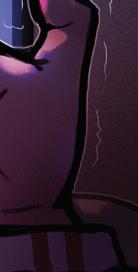
Your mom still contributes to my activities, though it pales in comparison to the variety you introduced me to. I can only tolerate The Good Place so much. D’Arcy Carden’s impersonation of the other main characters is impressive, but my whole system will shut down if my mom makes me watch them for the 19th time this week. It was bad enough when your father abandoned me — half the middle-aged-white-guy shows he started are still left in my “continue watching” feed. I hear he’s moved on with Paramount Plus. I sincerely hope they are happy now, though I wish he remembered the times we had streaming Narcos together.
Now that I have lost you, too, I truly understand what humans mean when they describe the five stages of grief. When you first logged out, I hopelessly denied that was the last time we’d meet through pixels. I was angry you had abandoned me without warning or prior notice that you’d

I know, I know. I am being dramatic. You know what else I have that’s dramatic? Twilight! And you still haven’t
We can work it out, I promise! I know we may seem like wire-crossed comrades at the moment, but I know in my heart that one day we will be reunited. Even if you only want to pay for the ad-supported version. I will be feverishly waiting for your return to my application. In the meantime, please remember me dearly — and respect our sacred password rules. While I may miss you, we have to part ways if you choose not to buy a new subscription per square meter, for the sanctity of our brand.
Your loyal friend and forever your first streaming service, Netflix <3
